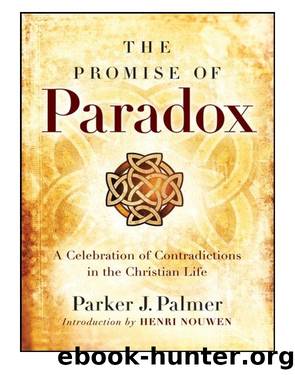The Promise of Paradox by Parker J. Palmer

Author:Parker J. Palmer
Language: eng
Format: epub
Publisher: Wiley
Published: 2010-05-11T00:00:00+00:00
Why Community?
Our need for community came from feeling isolated and fragmented at work and at home. Sallyâs concerns revolved around the difficulties of raising three children in suburban seclusion and of forming purposeful relations with other adults amid the logistical chaos of a five-person family. Parkerâs needs came from the lack of community in academic life and the larger question of civic community in America. Individually and together, we felt a need for community to simplify and integrate the scattered pieces of our lives.
Something had to give! So at the end of a dismal February, the five of us boarded a train and set off for Koinonia Partners in Americus, Georgia, a community we had read about for many years, the community that was to become the birth-place of Habitat for Humanity.1 We spent only a week there, calendar time, but it was kairos time on our spiritual journey. The simple fact of seeing good people living in community, in faithful partnership with the victims of oppression, gave us new hope and direction. And someone down there spoke words that we knew were true but had lacked the courage to say to ourselves: âYou donât think your way into a new kind of living; you live your way into a new kind of thinking.â
So we returned to Washington committed to spend at least the next year âin communityâ and with considerable trepidation took our first step: a leave of absence from Parkerâs job at the university. The prospect of twelve months without paychecks was not comforting, but we knew that community would continue to elude us as long as we put a premium on comfort.
Then began the search for a place. Koinonia Partners was a possibility, and so was another Koinonia near Baltimore. We had read about and corresponded with the Bruderhof.2 We visited Lindisfarne and Pendle Hill and got in touch with several other groups by phone and letter.3 These are (or were) very different kinds of places, but they have this much in common: at each of them, a group of people is trying to live together and touch the world, animated by spiritual insight.
We finally chose Pendle Hill, a Quaker living-learning community near Philadelphia, where we took up residence in the fall of 1974. Here we share a daily life of worship, study, physical work, common meals, and recreation with about sixty other people. Their ages range from one to seventy-one. Half or fewer are Quakers, and among the others, several of the worldâs major religions are represented. Pendle Hill is not a âpureâ community. It is also an educational institution with a staff, a board of managers, and a history that dates back to 1930. But at Pendle Hill, we have experienced one of the many versions in which community presents itself, and the experience has been compelling.
Download
This site does not store any files on its server. We only index and link to content provided by other sites. Please contact the content providers to delete copyright contents if any and email us, we'll remove relevant links or contents immediately.
Thirst by Scott Harrison(740)
Life Word by Jon Gordon(512)
Render Unto Rome by Jason Berry(482)
Produced by Faith: Enjoy Real Success without Losing Your True Self(413)
A Fork in the Road: Choose Poverty or Prosperity by Ligard Vidar(401)
Hello, Tomorrow!: The Transformational Power of Vision by Cindy Trimm(395)
Grand New Party by Ross Douthat(391)
Roy Williams Plays: 3 by Roy Williams(382)
A Guide to Confident Living by Norman Vincent Peale(371)
The Solomon Secret by Fleet Bruce(347)
25 Ways to Win with People by John C. Maxwell(328)
The Fred Factor by Mark Sanborn(327)
Praying the Book of Job by Elmer L. Towns(326)
How to Justify Torture by Alex Adams(320)
The Generosity Factor by Ken Blanchard(317)
Religious Ethics in the Market Economy by Karl G. Jechoutek(312)
The Life-Giving Leader by Tyler Reagin & Craig Groeschel & Andy Stanley(281)
Bold Followership by Maurice A. Buford(280)
Forbidden Fruit by Paul Kurtz(278)
